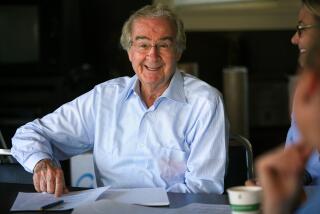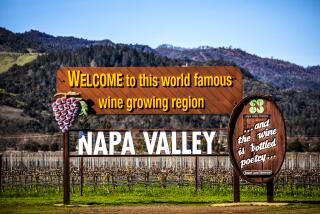Rolling the Dice in Napa
OAKVILLE, Calif. — First, there is the building itself. The winery. It sits half-buried in the Napa Valley earth, a monument of creamy limestone and redwood. A big, earth embankment surrounds it so that from the highway the whole thing looks like it’s trying to hide from the tourists.
And maybe it is. There are those here in the valley who believe that this thing, the Opus One winery, will reveal itself to be the folly that will undo the names and reputations of its makers, Robert Mondavi and the Baron Philippe de Rothschild.
Let me repeat that last part. The Baron Philippe de Rothschild. It’s one of those names, and never before has it been associated with any winery outside France.
Until today. That’s when the Opus One winery opens for the first time. And that’s when Napa will begin to find out whether Mondavi and Rothschild can pull off one of the great gambles in wine history.
To understand this gamble, first you have to understand the wine market. It is hurting. Once, years ago, the winemakers of Napa could go to bed every night knowing that the next day, Americans would drink a little more wine than they had the day before. This was a long-term trend, and reassuring.
Today, the reverse is happening. Each day, Americans drink a little less and buy a little less. In the beginning, the market began to go soft for the jug wines and then it moved up to the higher-priced stuff in bottles. Finally it hit the premium wines. These days, all over Napa, there is the certain knowledge that a shakeout is coming.
So now arrive Mondavi and Rothschild with Opus One, believing they can beat the odds. Actually, we should be correct here and point out that the baron went to his reward in 1988 after years of planning Opus One and was replaced by his daughter, Phillipine, who has shown the same inclination to roll the dice.
In any case, Opus One is not only the most expensive new winery in Napa’s history but probably the most expensive by orders of magnitude. In the production rooms, the grapes are sorted by hand to make sure no bad ones get into the bottle. The wine moves around the winery by gravity because mechanical pumps might put it in a bad mood. There is a full-time chef and a dining salon and on the walls of the dining salon hang very old mirrors hauled over from France.
The building probably cost $18 million to $20 million. Land in the neighborhood of Opus One goes for $40,000 to $50,000 per acre, and the winery picked up 140 of those.
And here’s the best part: the wine sells for about $60 a bottle. As America faces the morning after the 1980s, as the bills come due for a decade of indulgence, Mondavi and Rothschild are asking people to celebrate with the most expensive wine ever made in this country.
You would think they would worry. But no. These people behave as if they know something that you and I don’t.
“People will see the quality,” says Mondavi, and he tells a story.
“Back in the ‘40s, I persuaded my father to buy the Charles Krug winery because it meant we could make better wine. People said we would go broke.
“We didn’t.
“Then when I broke away from Krug and started the Robert Mondavi winery, people said I would go broke. I didn’t.
“And now they say it again. They say a winery cannot survive by selling wine at $60 per bottle. They say a partnership between the Mondavis and the Rothschilds will never last.
“And they are wrong this time just like they were wrong before.”
As a matter of fact, Opus One already has sold virtually all of its production for this year. Of course, these are preseason sales agreements with restaurants and retail stores. The customers’ response remains to be seen.
Maybe enough of the 1980s has survived, after all. Or maybe there are simply enough people out there who do not, in any case, have to worry about which decade they are spending their money, or what price they are paying, so long as the wine is the very best.
That is what Mondavi believes, and he seems to take delight in awaiting the outcome. As the conversation stops, the chef at Opus One announces lunch and Mondavi turns to go.
The lunch, it turns out, is a charity thing. An auction was held to see who would pay the most to have lunch at Opus One with Mondavi and Phillipine Rothschild. The successful bid came in at $16,000.
They served five wines at the meal, and everyone had a swell time.
More to Read
Eat your way across L.A.
Get our weekly Tasting Notes newsletter for reviews, news and more.
You may occasionally receive promotional content from the Los Angeles Times.










